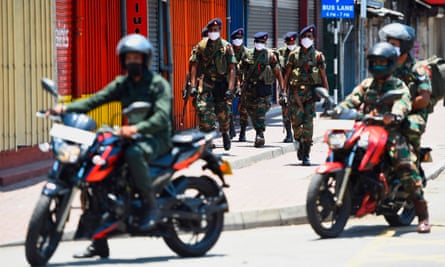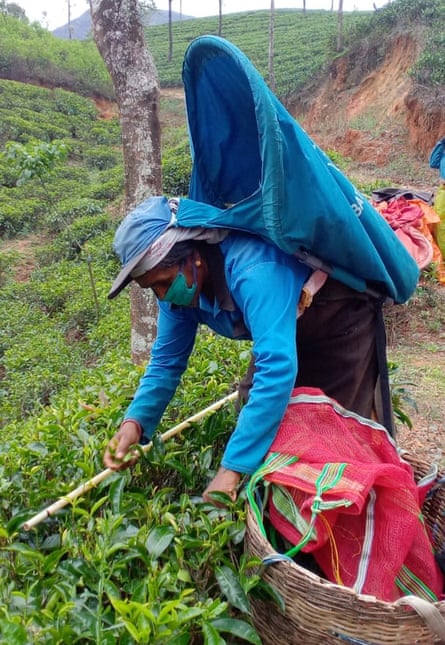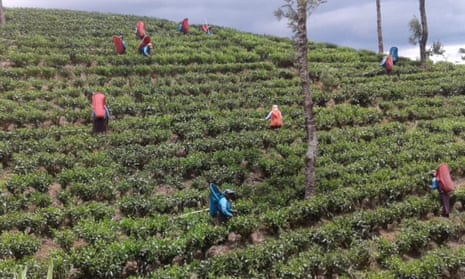In Sri Lanka, police have been enforcing tough lockdown measures and a strict curfew since March. The country’s inspector general has instructed police to take action against social media users who criticise the government or spread “malicious” pandemic information.
An exception has been made, however, for the country’s tea pickers. A caveat on the country’s lockdown order, issued on 20 March, read: “Paddy farming and plantation, including work on tea small holdings and fishing activities, are permitted in any district.”
The Ceylon Workers’ Red Flag Union say coronavirus public health measures mean little on estates. There are no facilities to wash hands with soap during a shift and masks are not always issued, even though it has been mandatory to wear them in public since early April.
Some workers have bought their own masks. Others improvise with handkerchiefs and serviettes. Where companies provide a cloth mask, the cost can be deducted from wages. In the humidity and heat, Red Flag has observed women constantly touching their faces to wipe away sweat. The union is concerned that, without health education, the masks may not be washed daily or used correctly.

A pressing concern is living conditions. Accommodation on tea estates generally consists of overcrowded, tin-roofed “line rooms”, usually five consecutive rooms in long rows. Each 30-square-metre room is a household, making social distancing impossible. Toilets are sometimes communal.
Because of the curfew, partners and children working and living in urban areas have been returning, so rooms are more overcrowded. Where household members work in neighbouring estates, cross-area infection is a risk.
With the political environment ominous – Human Rights Watch fears the country may be using the pandemic to curtail free speech – the critical voice of plantation trade unions has played a vital role in fighting deepening inequalities in a semi-feudal sector with a long history of exploitation.
Tea, along with rubber and coconut, is among the country’s leading exports. The plantation system, devised by British colonialists in the 1820s, was run with an indentured workforce, uprooted from India’s Tamil Nadu. The population of about 840,000 people only gained Sri Lankan citizenship in 2003.
Today, the work remains physically demanding, with poverty and debt bondage weighing heavily on estate communities. Smallholder tea farms, a more recent development dating back to the 70s and 80s, are believed to offer better working conditions.

The labour force, consisting predominantly of women from the island’s “plantation Tamil” communities, is marked by social exclusion and grinding poverty.
Demonstrations by civil society groups last year highlighted the chronic immiseration of tea workers, with protesters asking for a doubling of the minimum wage to 1,000 rupees a day (£4.22). And ethical brands do not guarantee better pay.
A 2019 investigation by the Thomson Reuters Foundation found take-home wages in some tea estates certified by Rainforest Alliance and Fairtrade were as little as 26 rupees a day (£0.11) after the deduction of debt repayments, salary advances and other fees.
With the pandemic curfew, even basic foods such as rice and lentils have been scarce, and women are struggling more than ever to maintain the health of their households
Malnutrition was identified by a 2017 World Bank study as a significant problem for women and children on plantations.
Reports of domestic violence and child abuse have also risen during the curfew.
Red Flag has been in negotiations with the Sri Lanka State Plantations Cooperation (SLSPC) to make sure the health of plantation workers is prioritised. Using daily updates from its local representatives, the union is trying to resolve problems quickly and successfully intervened over salary payments after some estates delayed paying wages.
“We have written to the president demanding that workers get paid 25 days of salary for two months, regardless of whether they are working or not,” said Menaha Kandasamy, an adviser to Red Flag.
Dilhan Fernando, chief executive of ethical tea company Dilmah, says the business has implemented several safeguarding measures, including social distancing, ensuring access to hand washing, food and medicines and paying employees a bonus of one month’s salary.
Fernando said all tea pluckers are given a mask, while factory workers are provided with masks, gloves and sanitiser. Despite a lack of evidence, workers are being advised to gargle with salt water. Fernando described how “education on the critical importance of the precautions as well as daily disinfection in and around the accommodation and production areas is carried out”.
SLSPC was asked to respond to questions on line rooms, hand washing and masks on their estates. They said that they have advised that workers wear face masks, keep a distance and drink Sri Lankan black tea, and that temperatures be checked at daily muster.
This article was amended on 21 May 2020 to add a comment from SLSPC and to credit Red Union Flag for the photographs.
